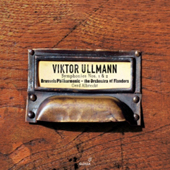
ESSENTIAL RECORDINGS

Viktor Ullmann (1898-1944) was an Austrian pianist and composer, who because of his Jewish descent, was deported to the concentration camp at Theresienstadt in 1942 where he stayed for over two years and was allowed to remain active as a musician. Along with the Czech composer Hans Krasa he was given the respomsibility of organising the leisure and music activities within the camp. This is where the music found on this CD was composed within terrible living conditions. His music, along with the music of other composers such as Bartok, Weill, Schoenberg, Mahler and many more, was classified as "degenerate music" by German authorities, based on the writings of physicians who claimed that these composers must be mentally or physically sick to write such music.
The two symphonies on this recording were actually born as Piano Sonatas that Ullmann had intended to eventually transcribe into orchestral works, but he died before doing that. Eventually the composer/conductor Bernhard Wulff orchestrated and reconstructed them, and these are the versions recorded here. The Symphony No. 1 (From my youth) shows a composer with an easy flow of ideas, with concise and economical use of motivic material, laid out over five short movements with a rhythmic agility similar to mature Stravinsky and an optimistic outlook that betrays his daily existence. Symphony No. 2 or should I say Piano Sonata No. 7, is the last piece of music that Ullmann finished prior to being transfered to Auschwitz where he was executed. Besides the lyrical and sad Adagio it is still a rather up-tempo work considering the conditions it was created in. It demonstrates a composer well in control of his ideas and a master at blending various strands together to form a cohesive whole. These are not groundbreaking or revelatory symphonic works, but they demonstrate and reinforce the resilience of the human spirit.
Gerd Albrecht and the Brussels Phiharmonic, formerly known as the Orchestra of Flanders, do us all a great service by presenting to us these rarely performed or recorded works of profound historical value, and the label Glossa should be commended for recording obscure music that most other labels would not even consider. It is always encouraging to know that some people within the artistic community are still commited to excellence and innovation.
Like vegetation that grows out of cracks in the pavement, music always finds a way to emerge from even the darkest corners of life.
Jean-Yves Duperron